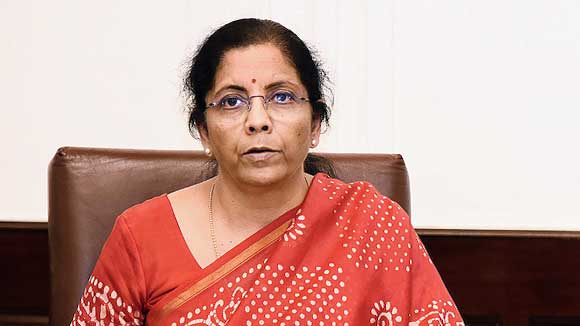The Modi government on Tuesday relaxed regulatory and tax compliance deadlines for companies and small businesses but the slew of measures announced by finance minister Nirmala Sitharaman fell way short of expectations of industry and market mavens who have been clamouring for a special economic stimulus package to revive a floundering, coronavirus-wracked economy.
Sitharaman said the threshold for default under the Insolvency and Bankruptcy Code has been increased to Rs 1 crore from Rs 1 lakh. The government removed charges for three months for debit card holders withdrawing cash from ATMs of other banks.
The government also waived off the minimum balance fee and extended the date for most direct tax and goods and service tax filings to June 30. The measures would help in reducing overcrowding at bank branches and push digital payments.
The last date for income tax returns for 2018-19 has been extended to June 30. Interest rate on delayed payments till June 30 have been reduced to 9 per cent from 12 per cent.
The mandatory linking of Aadhaar cards with PAN cards and the last date of tax dispute Vivaad se Vishwas scheme has also been extended to June 30.
There is also no need to pay 10 per cent penal interest after March 31. The relief has been extended till June 30.
For delayed payments of advanced tax, self-assessment tax, regular tax, TDS, equalization levy and other taxes to be made between March 20 and June 30, the interest rate has been reduced to 9 per cent from 12-18 per. No late fee and penalty shall be charged for delay relating to this period.
Those having aggregate annual turnover less than Rs 5 crore can file GST returns for March-May 2020 by the last week of June.
The moratorium for registration with MCA-21 has been extended by six months till September 30. There will be no additional fees for late filing. Besides, there is no mandatory requirement for holding board meetings during this period. She said the relaxation of 60 days has been granted for the next two quarters.
Industry reacts
Industry said the measures announced by the finance minister do give more time for meeting various regulatory compliances at all levels. However, more steps needed to be taken.
K.R. Sekar, partner, DeloitteIndia said: “We hope the government will follow this with an economic packages which would help and stimulate demand and growth for India under the challenging circumstances.”
Chandrajit Banerjee, director-general of CII, said: “While deadlines have been extended for most tax related compliances, some special decisions have also been taken for individuals by relaxing banking charges on minimum account balance and debit card transactions.”
Sanjay Kumar, senior director, Deloitte India, said: “Some of the year-end regulatory filing requirements have largely been deferred by 3 months. Reduction in interest on delayed filings may be considered somewhat below expectations”.
No interest, late fee and penalty will be charged. For the others, a reduced interest rate of 9 per cent will be levied.Mahesh Jaising, partner, Deloitte India, said “ while companies with turnover of Rs 5 crore or more may have to shell out interest in case of delayed payment of taxes, the rates will be halved to 9%, which is a reasonable move. However, a waiver of interest similar to those with turnover below such limit, would have been better to support liquidity. Specifically for strained sectors such as automobile industry, aviation industry and hospitality industry.”
AM, said “as per quick estimates by SIAM, it is expected that Plant closure of Auto OEMs & Components will lead to loss of more than Rs 2,300 crores in turnover for each day of closure.”
Mahesh Jaising, Partner, Deloitte India said “ while companies with turnover of Rs 5 crore or more may have to shell out interest in case of delayed payment of taxes, the rates will be halved to 9%, which is a reasonable move. However, a waiver of interest similar to those with turnover below such limit, would have been better to support liquidity. Specifically for strained sectors such as automobile industry, aviation industry and hospitality industry.”
Rajan Wadhera, President, SIAM, said “as per quick estimates by SIAM, it is expected that Plant closure of Auto OEMs & Components will lead to loss of more than Rs 2,300 crores in turnover for each day of closure.”
Newly incorporated companies will get another six months to file a declaration on commencement of business. Effectively, they get a year to start operations.
If a director does not comply with minimum residency requirement of 182 days, it will not be treated as a violation.
and applicability of The Companies Auditors’ Report Order 2020, which was supposed to have come into force in 2019-20, has been shifted to 2020-21, she said.
Sitharaman also tried to assuage the concern that there was 'no move to impose financial emergency as was claimed by some reports.'
During a financial emergency, 'the executive authority of the Union shall extend to the giving of directions to any state...' on financial matters. Article 360 has a provision requiring the reduction of salaries and allowances of all or any class of person serving a State or the Union. Once approved, it remains in force till revoked by the President.










